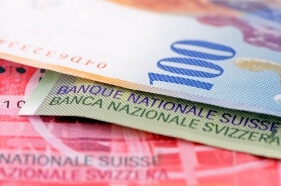The Swiss franc is sliding against some of its major currency rivals midweek. For the last week, the franc has been advancing as investors seek out safe-haven assets during the escalation in the US-China trade spat. The franc has ostensibly come back down to earth on recent economic data.
Switzerland has witnessed foreign direct investment slump in the last year, says a new report.
According to the 2019 AT Kearney Foreign Direct Investment (FDI) Confidence Index, Switzerland now ranks No. 13, down from No. 9 in 2018, as a top destination to attract FDI in the next three years. The country now sits behind the Netherlands â the US, Germany, and Canada are in the top three.
What is happening? Analysts say that investors are finding improved competitiveness elsewhere, particularly in the US, which recently implemented comprehensive pro-business tax reforms. As a result, Switzerland saw net negative FDI flows of $141 billion last year.
Meanwhile, currency traders have built large positions that are shorting the franc, showing that they believe the money will be weaker against the US dollar and the euro. Is this a sound strategy? In the short-term, it has not worked out, considering how investors poured their money into safe-haven assets, including the franc, after the US raised tariffs by 15% and China retaliated with its own tariff hikes.
On the data front, producer and import prices were flat in April compared to the same period a year ago, which were lower than the market forecast of 0.2%. Year-over-year, they have fallen 0.6%, which is higher than the median estimate of a 0.4% contraction. The data may give the Swiss National Bank (SNB) pause about normalizing monetary policy if inflation pressures are not there.
The USD/CHF currency pair rose 0.06% to 1.0093, from an opening of 1.0085, at 19:32 GMT on Wednesday. The EUR/CHF edged up 0.04% to 1.1306, from an opening of 1.1301.
If you have any questions, comments, or opinions regarding the Swiss Franc, feel free to post them using the commentary form below.
Swiss Franc Retreats From Safe-Haven Bolster As Foreign Investment Declines
